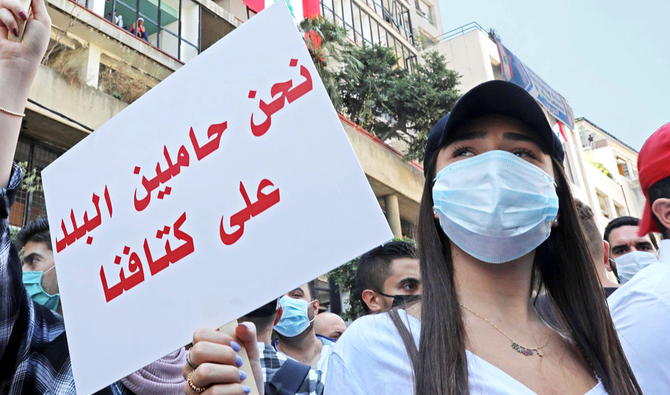BEIRUT: A cozy Beirut restaurant, Tenno once hosted a dog’s birthday party, vinyl record nights and stand-up comedians.
Those days are gone. Its doors collapsed and glass shattered in the port blast this month that killed at least 180 people and turned one of Beirut’s most popular pub streets into a disaster zone.
“We plan to rebuild ... we owe it to ourselves to not let things end this way,” said Mohamed Soliman, 28, one of the owners of the cafe which opened around 2 years ago. Money for repairs has poured in through online crowdfunding.
Many others will not rebuild, however, because it no longer makes sense to invest in a country where years of work can vanish in seconds.
“We’ve been saying we’re all on the verge. I don’t know how we made it this far. We’re not going to last,” said Maya Bekhazi of the union of nightclub, cafe and restaurant owners.
It is a tired cliché that the nightlife in Beirut — billed worldwide as a party destination — stands as proof of the capital’s ability to endure one crisis after another.
So much so that Lebanese have made a joke of their fabled resilience which has portrayed them partying through wars and assassinations, when behind the glitz the reality is much grimmer.
The past year, including Lebanon’s financial meltdown and the COVID-19 pandemic, has battered the service industry, a pillar of an economy that produces little. The August warehouse explosion left over 2,000 premises in tatters, putting tens of thousands more jobs at risk in a country with soaring unemployment and poverty.
The restaurant sector alone will cost at least $1 billion to reconstruct, Bekhazi estimates.
Even before the blast, hundreds of venues had shuttered with mass layoffs in an industry that employs a big chunk of Lebanon’s workforce.
In response to a question about what the state has done, Bekhazi laughs. “Nobody cares.” With low-wage workers hit hardest, she said, the union will help provide meals for employees for a month.
Beirut’s nightlife has long attracted investor money and performers from abroad, spawning images of extravagant soirees in ranking lists around the world.
Since last year, a currency crash has eroded the purchasing power of Lebanese, including among the middle class that most of these businesses cater to. Costs skyrocketed and suppliers demanded cash as dollars grew scarce.
The owners of Cafe Em Nazih, who also run a hostel and rooftop bar, do not plan on rebuilding now.
“To start from scratch, without any trust in the state, will be a loss. We could invest again and get hit by another 20 explosions,” said manager Nazih Dirani, who suffered a dislocated shoulder when the blast ripped through the cafe. “This place is my life. I know where every screw is.”
On social media, Lebanese posted videos of bloodied faces emerging from behind bar counters. Some spoke of a sense of loss in a city with few public spaces.
For Jade, founder of the entertainment group Factory People, the focus now is on keeping his 170 employees. The blast reduced one of its clubs to a pile of twisted metal. It cost nearly $2.5 million to launch and will need millions more to fix up.
“We kept investing despite it all,” the DJ said. “But now it’s like we’re in the middle of the battlefield and we ran out of ammunition.”


























